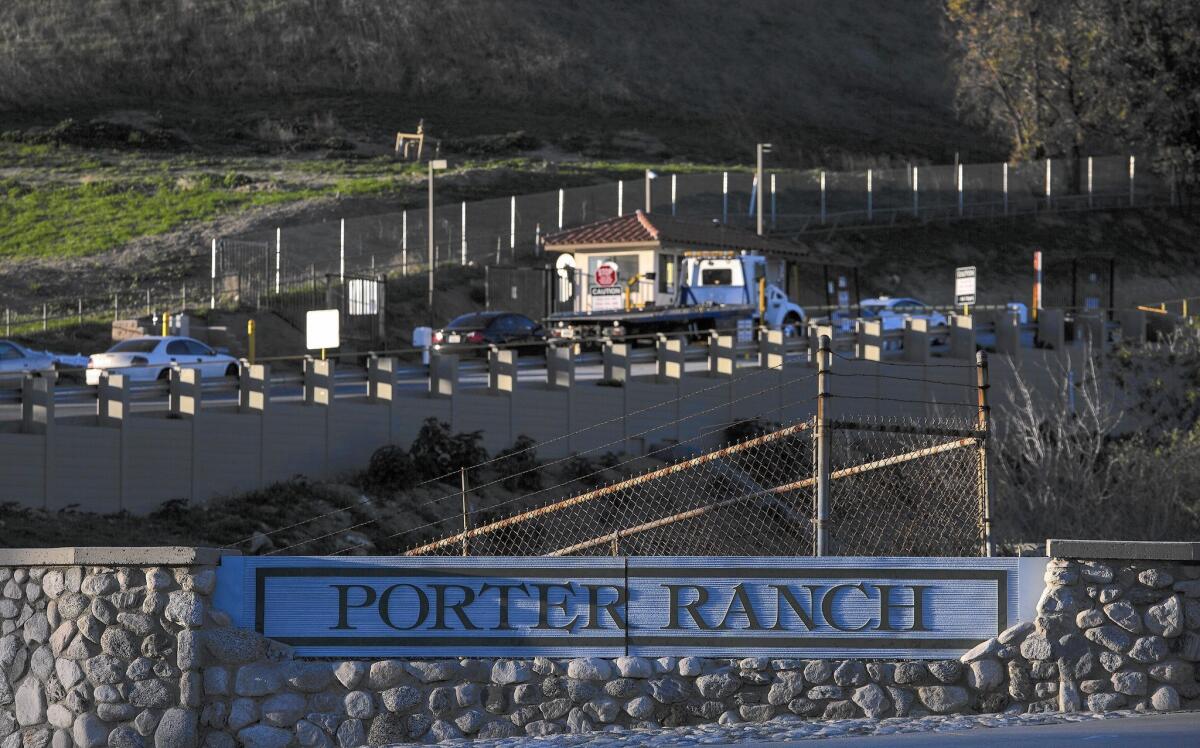Porter Ranch-area gas leak may end within days

Since the leak began Oct. 23 near Porter Ranch, it has sent about 80,000 metric tons of gas, mostly methane, into the atmosphere.
- Share via
An emergency relief well is expected to intersect Southern California Gas Co.’s damaged injection gas well near Porter Ranch as soon as Thursday, possibly ending the leak within days, regulatory and utility officials said Wednesday.
If all goes well with the intercept, workers could immediately pump slugs of mud and stabilizing fluids down the relief well into the damaged pipe. If those materials stop the leak, workers would pump in thick shots of a cement that would cure and permanently seal the well.
At that point, state inspectors would start a days-long process to determine whether the well has been killed, ending a leak that has sent about 80,000 metric tons of gas, mostly methane, into the atmosphere since the leak began on Oct. 23.
Join the conversation on Facebook >>
“We will very soon reach the point of intersection,” gas company spokeswoman Stephanie Donaldson said Wednesday afternoon. “But we’re not going to try and pinpoint a date and time for completion of this job for a couple of reasons: We don’t want to create false expectations, and we have to expect the unexpected.”
Officials involved with the effort, however, said they expected the relief well to breach the leaking well sometime Thursday, with the fluids to follow very quickly if there are no hitches.
The process was scheduled to begin on Wednesday with the relief well drill making a “soft touch” of the designated intersection point about 1.6 miles underground. That drill would be swapped the following day with one capable of cutting through the well’s concrete and metal casings in preparation for the administration of the fluids, mud and cement, which takes 48 hours to cure, officials said.
State regulators would then conduct inspections and pressure tests to certify that after nearly four months of environmental contamination, civic disruption and worry, Aliso Canyon Natural Storage Facility’s Standard Sesnon Well 25 was plugged.
Once the leak is stopped, residents temporarily relocated to leased houses and hotel rooms elsewhere will have seven nights to move back to their homes, in accordance with terms of a recent agreement between the gas company and the Los Angeles city attorney’s office.
However, Rep. Brad Sherman (D-Sherman Oaks), said Wednesday he wants to delay the start of the seven-day clock until another step is taken. Sherman wants the California Air Resources Board to certify that the air surrounding the Aliso Canyon field is free of natural gas.
Over the last three months, the well spewed more greenhouse gases than any other facility in California. The release of so much methane, a greenhouse gas several times more powerful than carbon dioxide, will contribute significantly to global warming, experts say.
Odorants added to the gas to aid in detecting leaks have prompted hundreds of complaints of nausea, respiratory problems and nosebleeds and have displaced residents from more than 4,400 homes in Porter Ranch and surrounding communities in the rolling foothills of the northern San Fernando Valley.
NEWSLETTER: Get essential California headlines delivered daily >>
The leaking well is one of 115 injection wells at the 80-year-old, 3,600-acre Aliso Canyon facility, which stores 86 billion cubic feet of gas that serves 11 million people in the Los Angeles basin. Many of those wells are corroded and mechanically damaged, the gas company said.
Yet it is the only field in a distribution area stretching from Porter Ranch 60 miles south to Santa Ana that can ensure reliability in both winter, when homes and businesses use significant amounts of natural gas for heating, and summer, when gas-fired generators supply power to air conditioners.
Efforts to kill the well are being conducted under new orders imposed by the Safety and Enforcement Division of the California Public Utilities Commission in consultation with the state Department of Conservation’s Division of Oil, Gas and Geothermal Resources.
The gas company, which is the subject of ongoing criminal investigations and civil litigation, has been ordered by the PUC not to “remove, temporarily store, bury or raze” anything within a radius of 400 feet of the well head.
Materials to be protected for use as possible evidence include all metal and concrete well casings, tubing, valves and valve parts, wire, gas and mud samples, gravel, cement mixtures and soil.
“It’s clear the costs of this incident are the gas company’s,” Robert Weisenmiller, chair of the California Energy Commission, said in an interview Wednesday. “The CPUC will be tracking all of the gas company’s costs to make sure they are not allocated to ratepayers and that the shareholders have full responsibility.”
Weisenmiller said he expected the issue to be highly contested.
Twitter: @LouisSahagun
ALSO
How much damage is the Porter Ranch leak doing to the climate?
Scientists detect gravitational waves, just as Einstein predicted 100 years ago
Coastal Commission fires executive director over objection of hundreds of supporters







